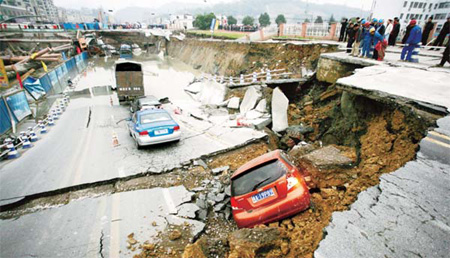Speed over quality
There are other examples.
Xiayi Bridge in Zhengzhou, Central China's Henan province: About 30 of the 80 railings are broken, putting pedestrians at risk. The bridge was a gift project for the 60th anniversary of the founding of the People's Republic of China; it is less than 2 years old.
Fengda Bridge in Fenghuang county, Hunan province: It collapsed in 2007 during construction, killing 64 people and injuring 22. The local quality inspection department blamed the construction company for greatly compressing the building period to meet the 50th anniversary of the founding of Xiangxi autonomous prefecture.
Wuhan Baishazhou Yangtze River Bridge: Major repairs have been required almost every year since it was completed in 2000.
Hangzhou Subway Line 1: A tunnel collapsed during construction in 2008, killing 21 workers.
All were gift projects with special completion deadlines. As a result, the experts agreed, officials and construction companies focus on speed at the expense of quality.
"If local officials undertake the projects as gifts to please their superiors, but violate scientific rules of construction, it's no doubt more potential safety hazards will be hidden," said Liu Qinglong, a sociology professor at Tsinghua University.
|
 A tunnel of subway Line 1 at Fengqing Street in Hangzhou, capital of Zhejiang province, collapsed during construction in 2008, killing 21 workers. [Photo by Wu Huang/for China Daily]
|
Under the ancient tradition, the more splendid and huge a public works project was, the more praise would be given to the local official who was in charge. Even today, officials take anniversaries of important events or holidays as good chances to display their abilities and achievements to the top bosses, in hope of getting more opportunities to be promoted.
"As long as they can present more big projects within their own term of office, which is generally five years, these projects will become their achievements in the region that help them win high marks from upper level or even central government," Liu said.
And if these projects later require countless repair or cost a person's life? That is the responsibility of the next leader in charge and has nothing to do with the former leader at all.
"Not all the top leaders of a region hold engineering degrees from universities," said Zhou, the law professor. "How could the standards of construction quality, construction period and when to put the project into use be decided by them, and not professionals?
Accountability
Zhou also warned that it's time to call off the gift projects, or China may face more losses and accidents like the high-fatality train crash.
"The central government needs to set up project quality responsibility on a life tenure tracing system, which clearly defines the responsibilities of the government leader in charge and the construction team leader. If a project develops serious quality problem or accidents due to quality problems, no matter where the major leader is, he or she still needs to be given criminal sanctions and administrative responsibility," Zhou said.
"The central government calls for a scientific concept of development, but the concept changed flavor to pursue only fast development of the economy at some places. Local officials in charge of enforcement forgot high quality requirements," Zhou said.
Zhao Jian, professor of economics at Beijing Jiaotong University, said that fines and other punishments are too puny to deter violations. To get officials' attention, he said, "The central government should greatly enhance the punishing penalties, strictly solve a batch of big cases and punish the people in charge."
Getting tough
Liu Qinglong, the sociology professor, echoed Zhou's view, but said that harsh punishment would not solve the fundamental problem that leads to poor quality. He sees that as a faulty view of achievements and China's unscientific system of evaluating performance by government workers.
"Our current performance evaluations are based mainly on some hard unalterable quota, like the rate of increase in the GDP, the number of big projects, common people's satisfaction, the number of petitioners and cases of big accidents. This kind of evaluating system can only make more cadres want to build more prestige and gift projects to increase their own achievements," Liu said. "These projects are just ladders for their promotion, and who cares about the safety hazard in the future."
To change the situation, he suggested that assessment criteria be diversified. The upper level or central government cannot be the only judge of cadres' performance, but needs to introduce public opinion polling as a supportive tool. And the news media should be a watchdog, he said.
"The process of setting project quality enforcement and supervision lacks a strict basis in law," Zhou Hongjun said.
In a mature society ruled by law, even the government budget is considered as law, so leaders and government workers are very limited in the decisions they can make. Society calls for managing state affairs according to law, Zhou said, so it's essential that specific laws be incorporated into cadres' assessment criteria.
To improve the quality of government work, Xia suggested that the central government set up more good examples of people who not only follow the concept of sustainable development, but also own up to their responsibilities and are brave in making innovations. To highly promote these cadres nationwide and call for all others to learn from them would cultivate the correct view of achievements, he said.
Feng Xin contributed to this report.
